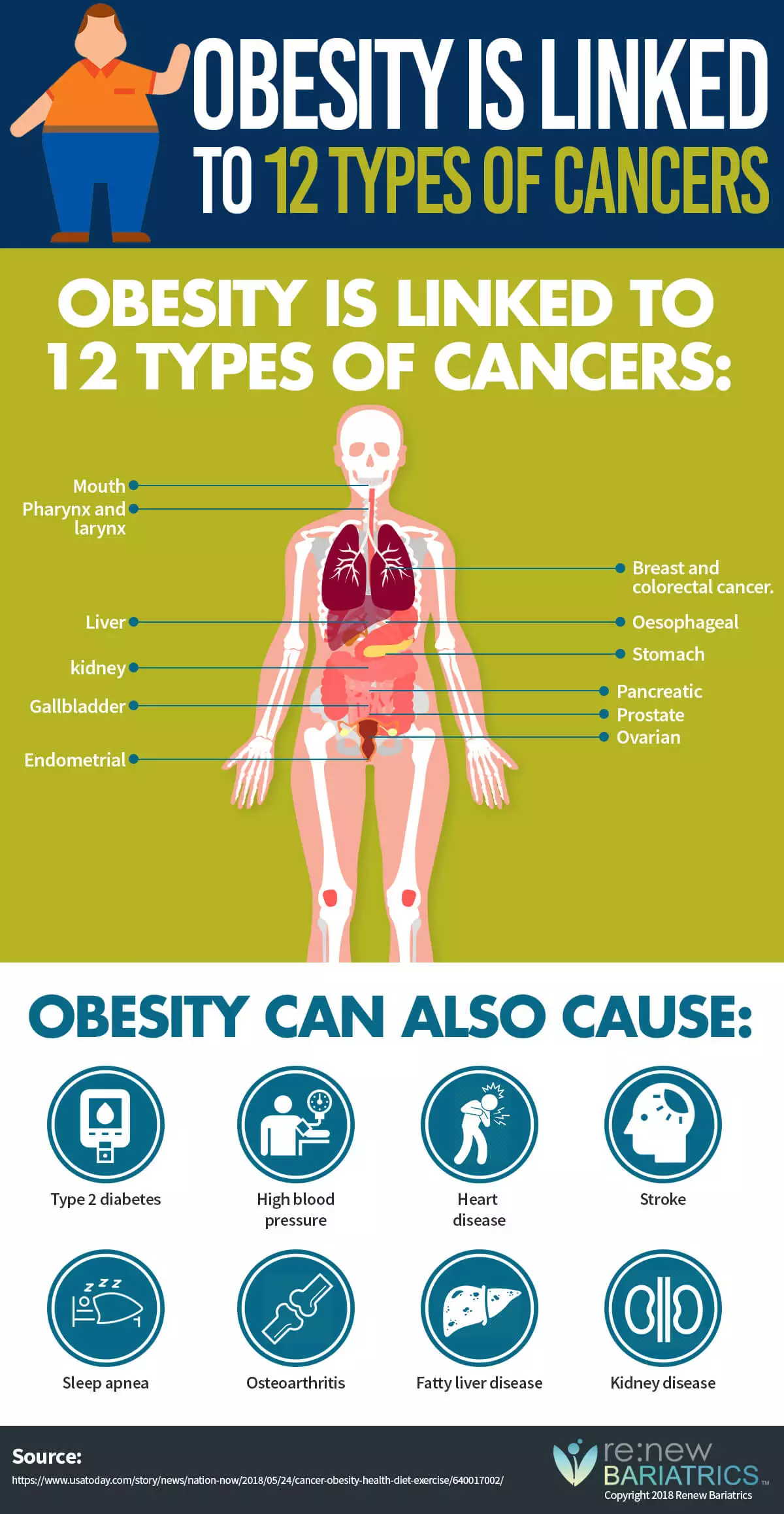Obesity has been to linked to cancer. there are 12 types of cancers that can be caused by being too heavy. That is why it is so important to focus on your health.
When you bring up the topic of obesity, most people think of diabetes, high blood pressure, heart attacks, and even strokes. There’s one disease that’s neglected, lurking in the shadows of modern-day gluttony and the obesity epidemic: cancer.
While the origins of certain cases of cancer remain mysterious and challenging to pinpoint, researchers have found higher instances of cancer among individuals considered obese. Most of the evidence linking obesity to cancer comes from cohort studies, a type of observational study. Due to the nature of the studies, some people remain skeptical, regardless of how substantial the evidence may be.

1. Liver Cancer
Multiple studies have found that having a high BMI and type 2 diabetes increases your risk of liver cancer. Obesity is known to cause type 2 diabetes, and diabetes can lead to cancer. According to the European Journal of Cancer, people who are obese are twice as likely to develop liver cancer. Also, men are more likely to develop liver cancer from being obese as opposed to women. Unfortunately, your lifespan decreases drastically with a liver cancer diagnosis. The 5-year survival rate for localized liver cancer is a measly 31%.
2. Kidney Cancer
Another very fatal form of cancer caused by obesity is kidney cancer. People who are obese have a higher risk to develop Renal Cell Carcinoma (RCC), a type of kidney cancer that starts in the lining of tubes in the kidney. Once RCC spreads outside the kidney, it becomes much deadlier. Also, high blood pressure is caused by obesity, and in turn, high blood pressure is a known cause of kidney cancer. Fortunately, survival rates of kidney cancer are much higher than that of liver cancer.
3. Pancreatic Cancer
Obese individuals are 1.5 times more likely to develop pancreatic cancer. Pancreatic cancer is one of the fatal cancers there is, much more lethal than liver cancer. The 5-year survival rate is only 6%. Obesity is often regarded as a risk factor that can be changed, similar to smoking. Although pancreatic cancer remains rare, there’s an increased risk the higher your BMI is.
4. Endometrial Cancer
If you’re not familiar with endometrial cancer, it’s a type of cancer that starts in the lining of the womb. It can spread to the rectum, vagina, ovaries, and more organs. More than half of endometrial cancers are caused in part by obesity. A woman who is morbidly obese is about seven times more likely to develop this form of cancer. If the cancer is caught early and only has spread regionally, the 5-year survival rate is 69%. Otherwise, it is 16%.
5. Gastric Cardia Cancer
Gastric Cardia Cancer, otherwise known as stomach cancer, is a rare form of cancer that begins as a tumor inside the stomach. Obesity is thought to be a cause for cancerous tumors to grow in the cardia (upper stomach). Some sources say that people who are obese are two times as likely to develop this type of cancer. The 5-year survival rate for cancer that’s localized in the stomach is 65%. If cancer has spread outside of the stomach, the 5-year survival rate drops down to 29%.
It’s safe to say that obesity has a strong link to some of the deadliest types of cancer. If obesity doesn’t have a direct link itself, then there could be a link between some of the side effects such as high blood pressure and diabetes. Remember, obesity is often considered a changeable risk factor, meaning it’s not too late to lose weight and increase your lifespan.
6. Mouth Cancer
The link between obesity and mouth cancer, also known as oral cancer, is an area of growing interest and concern within the medical community. While the direct connection between obesity and mouth cancer is less straightforward than with some other forms of cancer, research suggests that obesity may increase the risk of developing oral cancer through several indirect pathways.
Obesity is associated with chronic inflammation, which can lead to DNA damage and, over time, increase the risk of cancer development, including in the mouth and oropharynx. Obesity often coexists with other risk factors for oral cancer, such as tobacco use and alcohol consumption, which may synergistically increase the risk. Additionally, obesity can lead to changes in the body’s hormone levels, such as increased insulin and insulin-like growth factor (IGF), which have been linked to cancer growth and progression.
The metabolic disturbances caused by obesity, including altered levels of adipokines and cytokines, can create an environment conducive to cancer development. While the research is ongoing, these findings underscore the importance of maintaining a healthy weight as part of a comprehensive strategy to reduce the risk of mouth cancer and other obesity-related health conditions.
7. Larynx Cancer
Obesity’s impact on health extends to various forms of cancer, including laryngeal cancer, which affects the larynx or voice box. The relationship between obesity and laryngeal cancer is complex and multifaceted, involving a mix of direct and indirect mechanisms. While the direct causal links between obesity and laryngeal cancer are still under investigation, the evidence suggests that obesity contributes to an increased risk of developing this type of cancer through several pathways.
One of the primary mechanisms through which obesity may influence the risk of laryngeal cancer is through the promotion of systemic inflammation. Obesity leads to chronic low-grade inflammation, which can cause DNA damage and contribute to the initiation and progression of cancerous cells in the larynx. Additionally, obesity is associated with metabolic syndrome, which includes conditions such as hypertension, dyslipidemia, and insulin resistance. These metabolic abnormalities can affect cellular processes and hormone levels, potentially leading to an environment that favors the development of cancer.
8. Gallbladder Cancer
The relationship between obesity and gallbladder cancer is more direct and has been more extensively studied compared to its association with some other cancers. Gallbladder cancer, though relatively rare, has clear links to obesity, a major modifiable risk factor for this disease. The mechanisms through which obesity increases the risk of gallbladder cancer involve a combination of metabolic, hormonal, and inflammatory pathways that contribute to the development and progression of cancerous cells in the gallbladder.
One of the primary ways obesity contributes to the risk of gallbladder cancer is through the development of gallstones, which are significantly more common in obese individuals. Gallstones are hardened deposits of digestive fluid that can form in the gallbladder, and their presence is a major risk factor for gallbladder cancer. The risk of gallstone formation increases with obesity due to changes in bile composition and gallbladder motility, leading to bile stasis and the precipitation of cholesterol and other constituents into stones. Chronic inflammation caused by gallstones can lead to cellular damage and, over time, increase the risk of gallbladder cancer.
9. Breast Cancer
The link between obesity and breast cancer has been extensively studied, revealing a complex relationship influenced by factors such as menopausal status, hormone levels, and inflammation. Obesity is recognized as a significant risk factor for breast cancer, particularly among postmenopausal women. In this group, the risk increase is attributed to the higher levels of estrogen produced by adipose tissue. After menopause, when the ovaries cease estrogen production, fat tissue becomes the primary source of estrogen. Elevated estrogen levels are associated with an increased risk of breast cancer because estrogen can promote the growth of cancerous cells in the breast.
Obesity is associated with chronic low-grade inflammation, a condition that can lead to DNA damage and contribute to the development of cancer. Adipose tissue, especially when present in excess, secretes pro-inflammatory cytokines and adipokines, which can create an environment conducive to cancer development. Additionally, obesity can lead to insulin resistance and higher levels of circulating insulin and insulin-like growth factors (IGFs), which have been shown to promote cell proliferation and inhibit apoptosis, further increasing the risk of breast cancer.
10. Osophageal Cancer
The relationship between obesity and osophageal cancer is significant and complex, involving various mechanisms that contribute to the increased risk observed in obese individuals. Osophageal cancer is primarily of two types: osophageal adenocarcinoma and osophageal squamous cell carcinoma. Obesity is more strongly associated with an increased risk of osophageal adenocarcinoma, a connection that has been the focus of much research.
One of the key pathways linking obesity to osophageal adenocarcinoma involves gastroesophageal reflux disease (GERD). Obesity, particularly the accumulation of visceral fat, increases intra-abdominal pressure, which can lead to GERD. The chronic reflux of stomach acid into the osophagus can cause Barrett’s osophagus, a condition where the osophageal lining changes to resemble the lining of the intestine. Barrett’s esophagus is a significant risk factor for developing osophageal adenocarcinoma. The inflammation from the acid reflux can lead to DNA damage and, over time, the development of cancerous cells.

11. Ovarian Cancer
The relationship between obesity and ovarian cancer has been the subject of considerable research, with studies indicating that obesity may modestly increase the risk of developing ovarian cancer. Unlike some cancers where the link to obesity is more clearly defined, the connection between obesity and ovarian cancer is complex and influenced by various factors, including hormonal and inflammatory pathways.
Obesity is characterized by an excess of adipose tissue, which can produce estrogen through aromatization of androgens. High levels of circulating estrogen have been implicated in the development of certain types of ovarian cancer, particularly those that are estrogen-receptor positive. Furthermore, obesity leads to a state of chronic low-grade inflammation, which can contribute to DNA damage and the promotion of a tumor-friendly environment. Adipose tissue secretes various adipokines and cytokines that can influence cell proliferation, apoptosis, and angiogenesis, potentially affecting cancer risk and progression.
Insulin resistance and the resulting hyperinsulinemia are also common in obese individuals. Insulin and insulin-like growth factors (IGFs) can promote ovarian cancer cell growth and inhibit apoptosis, further contributing to cancer development. Additionally, obesity is associated with alterations in levels of sex hormone-binding globulin (SHBG), leading to increased bioavailability of estrogen and testosterone, which may stimulate ovarian cancer growth.
12. Prostate Cancer
The relationship between obesity and prostate cancer is nuanced and has been the subject of extensive research, revealing a complex interplay of factors. Unlike some cancers where obesity clearly increases risk, the link between obesity and prostate cancer involves both risk of incidence and outcomes after diagnosis.
Studies have shown that obesity may be associated with a slightly lower risk of developing low-grade prostate cancer but a higher risk of developing aggressive prostate cancer. The reasons behind this differential impact are not fully understood but are thought to involve hormonal, metabolic, and inflammatory pathways influenced by obesity. For instance, obese men often have lower circulating levels of testosterone, which could potentially reduce the risk of low-grade prostate cancer, given the role of testosterone in prostate cancer development.
However, the chronic inflammation associated with obesity, along with alterations in insulin and insulin-like growth factors (IGFs), could contribute to the progression of more aggressive prostate cancer. These factors can promote cell proliferation and inhibit apoptosis, creating an environment that favors cancer growth and progression.
The Link Between Cancer and Obesity
The link between obesity and cancer is both significant and multifaceted, with obesity recognized as a major risk factor for several types of cancer. This relationship is underpinned by various biological mechanisms that contribute to cancer development and progression. Understanding these mechanisms is crucial for developing strategies to reduce cancer risk and improve outcomes for those living with cancer.




